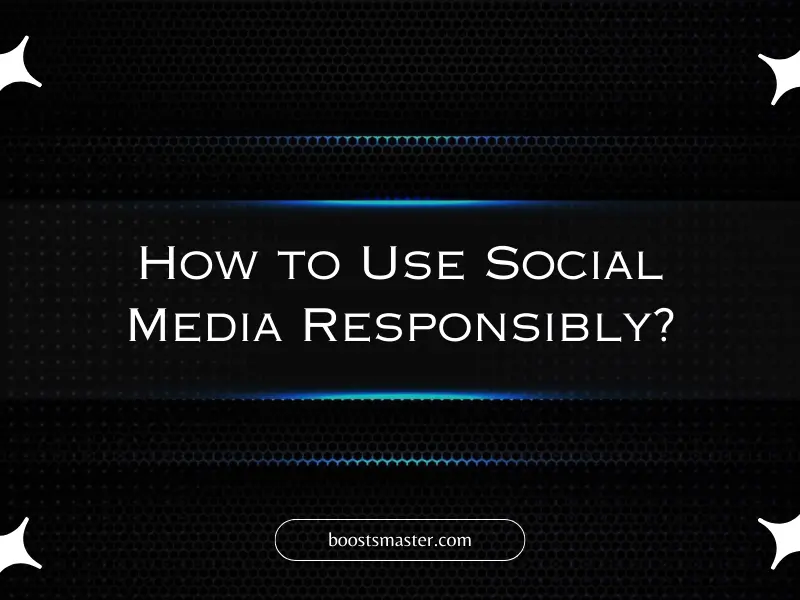Social media is a powerful tool that allows you to connect with others, share stories, and even learn new things. It has revolutionized lives, making it easier to expand your perspectives and explore different identities. However, it’s important to use it responsibly. While the benefits are clear, from keeping in touch with important people like family and friends to staying updated on current events, the disadvantages can be just as impactful. Mass adoption of social media means that individuals are constantly bombarded with content, making it harder to stay focused or even productive.
Being mindful and intentional with your social media activity is key. It’s all about finding a balance between engaging with content and maintaining your mental health. When used thoughtfully, social media can have positive impacts by building awareness, engagement, and even business opportunities. However, excessive consumption can lead to overwhelming emotions or even stressful situations. For young teenagers, this could result in horrible consequences, so it’s crucial to set boundaries and practice ethical and humane practices when interacting online.
15 Ways To Use Social Media More Responsibly
1. Turn Off Notifications
To use social media more responsibly, it’s important to turn off notifications. This helps break the information loop that can easily make you feel attached to your smartphone. Without constant pings, you won’t get distracted from important tasks like work or spending time with family and friends. This way, you’re less likely to get sucked into a rabbit hole of scrolling, which can easily happen when you get caught in the cycle of checking your accounts for updates.
It also helps reduce FOMO (the Fear of Missing Out), which often happens when you feel the need to stay constantly updated. By controlling your notification settings, you create a healthy framework that allows you to focus on what matters during your morning, afternoon, or evening. Instead of mindlessly checking, you can schedule specific times to check your accounts, keeping your day structured and balanced.
2. Watch Your Time
Spending too much time on social media can affect your well-being. Studies show that scrolling endlessly through feeds on platforms like TikTok and Instagram may leave you feeling unproductive at the end of the day. Researchers suggest that if you want to make the most of your time, you should aim for a sweet spot—around 30 minutes a day on social media.
This is enough to stay updated without negatively impacting your health. iPhone and other smartphones even have features to help you monitor and limit screen time, like real-time reports and app time limits. By setting limits, you can reduce feelings of loneliness and lower the risk of depression, leading to better health outcomes overall. If you can manage your usage, it’ll make a big difference!
3. Follow With a Purpose
When you follow accounts on social media, always ask yourself if there’s a reason behind it. Rather than scrolling aimlessly, make your following intentional. The feeds we curate directly impact our mindset, so it’s important to follow accounts that bring positivity, inspiration, and creativity into your life. Avoid accounts that fill your feed with negativity, jealousy, or foster a sense of comparison.
A purposeful follow can help you see different perspectives, enjoy posts that spark joy, and engage with people from various backgrounds, cultures, and beliefs. You can diversify your digital worldview and feed by following accounts that reflect a mix of interests and experiences. If any account no longer aligns with your purpose, don’t be afraid to unfollow and protect your mental space. This will allow your social media to become a space for inspiration, hope, and positive engagement.
Check our Blog Post on What is a Social Media Influencer?
4. Stop Mindless Scrolling
Social media can be very interesting, but if you’re not careful, you can get caught in the endless loop of mindlessly scrolling. Just like a slot machine, you might keep going, hoping to see something new or exciting in your feeds, but most of the time, it’s just curated content that doesn’t add much value to your life.
This can lead to a spiral of wasted hours and procrastination. Instead of comparing yourself to the cooler lives of others, try to recognize when you are just scrolling out of habit. Stop and take a moment for some cleansing — maybe step away and do something more meaningful like reading or learning. A little mindset shift can help you use social media in a more positive way that adds value to your personal growth.
5. Beware of Clickbait
Clickbait is everywhere on social media. You may have seen provocative headlines that promise to reveal shocking truths, but often, these are just designed to generate more clicks. People often get trapped in this cycle because they want to know more, but in the end, the content is often misleading or fake news. These dubious headlines create huge issues by spreading misleading information.
When scrolling through your feeds, it’s easy to click on something that catches your eye, but take a step back. Always check if the information is from reliable sources before clicking a hyperlink or sharing it. Many websites use clickbait to draw attention, making it essential to pause and acquire factual information from trustworthy sources. Studies show that sharing fake content without thinking can propagate misleading information and contribute to the void of truth. So next time, think twice before you click and make sure you’re not just helping negative headlines take over your feeds.
6. Monitor Your Emotions
Social media can have a big effect on our emotional health. As human beings, we are naturally social creatures, and the connections we make online can bring joy and a sense of belonging. However, the negative side of social media can lead to comparing life, and the pressure to show a perfect version of ourselves through filters and photoshop can harm our self-worth.
To keep your emotional health in check, it’s important to monitor your emotions while using these platforms. If you notice your mood dropping or your feelings getting affected by what you see online, it might be time to take a break and step back. You can try a digital detox to reset and focus on activities that help you reflect and gain understanding. With some introspection, you can come back to social media with a new mindset that values real connections over the illusion of perfection.
7. Likes Do Not = Self-Worth
It’s easy to get caught up in the likes and posts we receive on social media, but likes do not equal self-worth. Studies have shown that likes act like a reward for our brain, triggering reward circuitry, similar to the feeling we get from eating chocolate or winning money. The truth is, these are temporary boosts that have little to do with our actual intellect or image.
When we rely on these likes for validation, we may overlook the reality of our true worth. It’s easy to let this influence how we see ourselves and our friends, but it’s important to detach from this and approach social media in a healthier way. Posts can get liked, but that doesn’t necessarily indicate the outcome of our worth as individuals. As Psychological Science compares the effect of likes to something as simple as eating comfort food, it’s easier said than done, but we need to remind ourselves that these numbers do not define us.
8. Understand Privacy Settings
When using social media, it’s essential to protect your privacy by regularly reviewing your privacy settings. This allows you to restrict who can see your profile, posts, and photos. By adjusting these controls, you can ensure that only trusted people can access your private information. For example, you can make your profile private to avoid unnecessary exposure to prying eyes.
Always keep settings up to date to stay in control of your digital presence. Familiarize yourself with each platform’s site policies and security settings to reduce the risk of harmful intent or attacks from a cyber criminal. Don’t forget to limit the amount of public information in your bio, education, or employer details that could potentially vulnerable you to unwanted monitoring. Regularly check for updates and make sure to implement restrictions as needed to maintain your safety and confidentiality. Keeping your information security tight will ensure that you’re not putting yourself at risk.
9. Build A Positive Digital Reputation
When using social media, it’s important to be mindful of the power your words and actions hold. Social presence can shape how friends, family, and even potential employers see you. Negative comments or controversial photos can have lasting effects because what you share often lives forever.
Always think twice before you post, as poor decisions can lead to negative content that might harm your reputation. Stick to positive, relevant, and uplifting content that reflects your true self. Remember, a good rule to follow is to always be honest and share things that are informative or add value to others’ lives. By being thoughtful in your social media decisions, you can build a reputation that sticks for the right reasons.
For businesses seeking a leg up, our Social Media Management Services can help you build ethical, community-driven campaigns while boosting ROI.
10. Give Your Phone A Rest At Night
Phones can be a big cause of trouble when you’re trying to fall asleep. The blue light from your smartphones keeps your brain engaged, making it hard to turn off for the night. Even a quick glance at social media can stimulate your mind, making you toss and turn.
This can prolong your sleep and cause you to feel tired the next day. Psychologically, it’s important to set bedtime rules—like turning off your phone 30 minutes before bed. It’s best to establish a nighttime routine, leaving your phone in another room to discourage activities that may lead to insomnia and anxiety. Try to log off and say goodnight to your phone to get a restful sleep. A long, productive day deserves a good night’s rest, so cutting off screen time is an essential habit for better overall well-being.
11. Think Twice Before Posting
Before you hit the post, always pause and think about your digital footprint. Everything you like, share, or comment on stays online, sometimes for years. A picture or video you upload now could be seen by the general public and impact your future, like when you’re applying for a job or a college. It’s essential to remember that what you post today could be part of your online presence in 10 years. Ask yourself: Would you still be comfortable with this post in the future? Keeping things private and protecting your online presence is one of the best ways to use social media more responsibly.
12. Be Aware: Nothing is Private Online
When you post something on social media, remember that it’s never truly private. Even if you think you’ve deleted or erased it, the digital footprint is permanent. Screenshots can easily be taken and shared, meaning your content could be trackable and accessible by anyone, anytime. Always be careful with what you share, especially personal information like your location, birthday, or school uniform.
Public access means exposure to a larger audience than you might realize. It’s important to manage your privacy settings and think twice before clicking post. Once something is online, it’s never truly gone – so responsibility and caution are essential. Always ask yourself: Is this content something I’d feel comfortable with strangers seeing?
13. Be in Control of the Content You See
It’s important to be mindful of the content you see on social media. You don’t have to stick to what the apps recommend. Instead, take control by choosing the accounts you follow and the type of content you interact with. If something doesn’t make you feel good, don’t hesitate to unfollow or block those accounts. Even if it’s a post on TikTok or YouTube, remember, your mental health and well-being come first. Consider what you spend your time on because it can have a big impact on how you feel. By staying in control, you can make social media a tool that brings you joy, not stress.
14. Use Social Media for Good
Social media is a powerful tool that can be used for much more than just entertainment. It’s an excellent platform for raising awareness about important causes and issues. By sharing resources and spreading the word, you can make a real impact on the lives of others. Whether you’re sharing information about local politics or global causes, it’s a great way to stay connected with the world around you. You can help others by offering advice, support, or simply by spreading positive messages. The ability to use social media for good is in your hands—use it to inspire and create change.
15. Know When to Take Social Media Breaks
Taking a social media break is essential for your mental health. Constantly checking apps can make you feel stressed, so it’s important to rest and reset your mind. Set time limits for your screen time to avoid spending hours online. You can use website blockers or apps that help reduce screen time to give yourself a healthier balance between the real world and technology.
If you feel like you’re getting overwhelmed, it’s a good idea to stay offline for a while. Giving yourself a chance to rest can help you focus better and feel more refreshed when you return to social media. Sometimes, it’s difficult to step away, but it’s crucial for your well-being. Consider using these tools regularly to maintain a good balance for your mental health.




